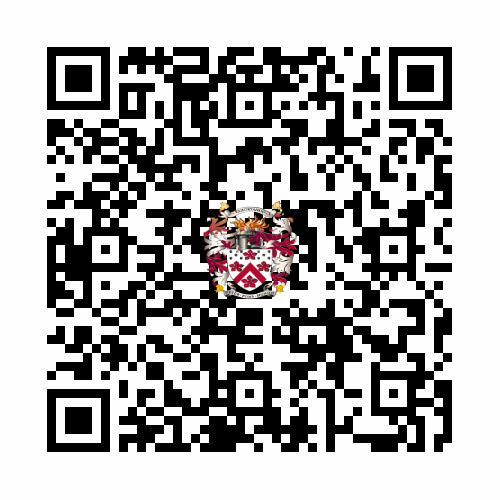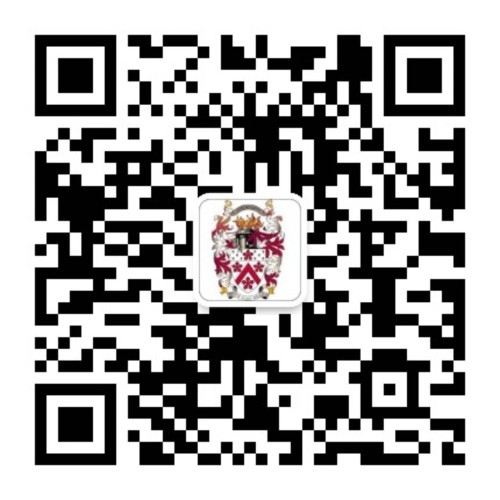Welcome to Dr Gabb's Chemistry Class
In today’s edition of our Open Class series, we enter the chemistry classroom of Dr David Gabb. In this class, he guides students in exploring the mysteries of halogens, delving into the scientific principles underlying chemical reactions. By emphasising observation, questioning, and hands-on practice, he prepares students to master the fundamental laws and principles of chemistry. Let's explore Dr Gabb's chemistry class and experience his unique teaching approach.
What is the Class About?
Dr Gabb opens his chemistry class with thought-provoking questions, engaging students in active participation. In this class, he introduces the physical properties of the halogens (Group 17 elements), including chlorine, bromine, and iodine, and demonstrates their unique characteristics in different states as well as their preparation processes. Students personally experience and observe these elements in gaseous, liquid, and solid states, particularly the captivating purple vapor produced by heating iodine. He also has students react each element with various salt compounds, observing and comparing their reactivity. In Dr Gabb's view, it is crucial for students to witness chemical reactions firsthand. "This way, they can relate it to their daily lives, making it easier to remember than merely reading textbook content.”
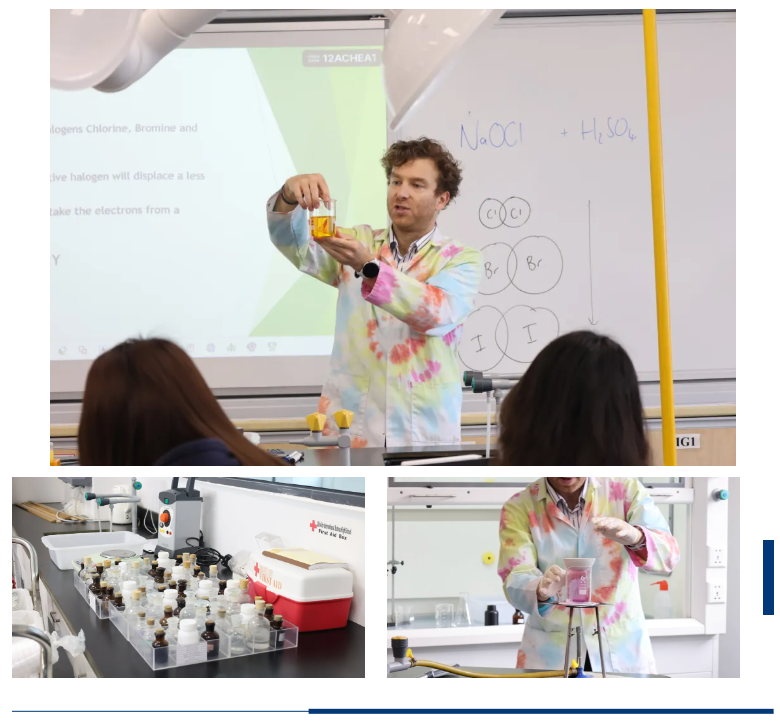
Teaching Style
Dr Gabb's classroom is filled with interactive and hands-on activities, which engage students more deeply and provide them with a richer understanding of the content. He believes that observation is the most critical aspect of chemical experiments. To illustrate abstract concepts of elements, he utilises practical demonstrations and actively involves students in the learning process. When conducting any chemical experiment, he emphasises the importance of wearing proper lab attire and safety goggles to ensure safety. During titration experiments and halogen substitution reactions, he encourages students to confidently describe the color changes they observe in the reagents. While prioritising safety, he always encourages students to experiment boldly, engage in active discussions, and cultivate their critical thinking skills to effectively analyse experimental results.
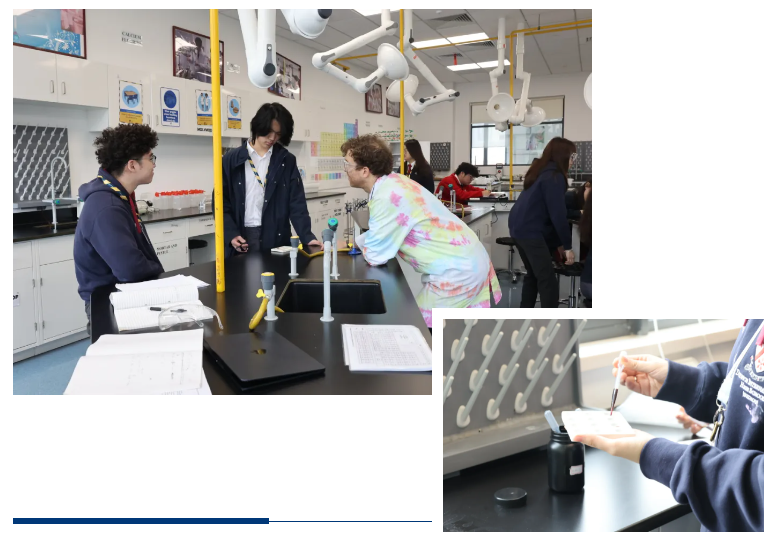
Dr Gabb believes that science is inherently tied to questioning. "All great scientific achievements began with observing phenomena, asking questions, and exploring the reasons behind them." In the classroom, he constantly asks questions to foster an inquisitive mindset, such as using a spinning wheel to randomly select students to answer, which adds an element of excitement to class participation. The "randomness" of the wheel ensures that every student must think carefully about each question, as they may be called upon at any moment.
Additionally, Dr Gabb utilises platforms like ClassPoint to allow students to share their answers, facilitating class-wide discussion and understanding the strengths and weaknesses of different responses. "This not only helps students better understand the questions but also teaches them how to perform better on exams," he explains.
Through diverse teaching methods, Dr Gabb successfully brings the chemistry knowledge from textbooks to life, significantly increasing students' learning enthusiasm and effectiveness.
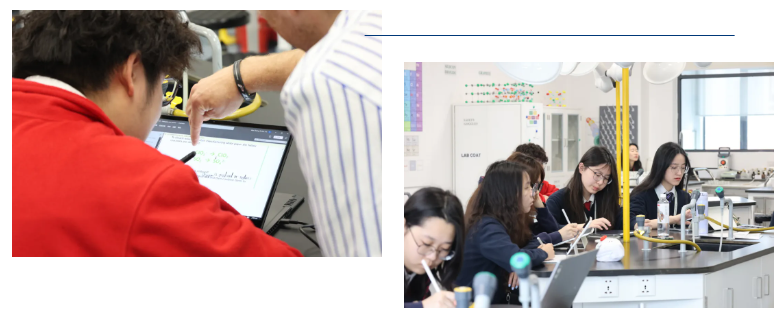
Education Philosophy
Dr Gabb's chemistry class is centered around cultivating curiosity, critical thinking, and practical application. He explains his educational philosophy: "I aim to help students understand that science is not just a series of facts to be memorised, but a toolbox for examining the world. When we observe the natural world, we must constantly ask questions and apply a set of systematic procedures to find the correct answers to these questions."
During the teaching process, Dr Gabb focuses on explaining the process of scientific discoveries and the experiments that researchers have conducted to uncover these insights. "I want my students to truly contemplate the nature of science and why it is so vital to the world. If they can grasp this fundamental understanding, it will not only benefit them in conducting scientific experiments, but it will be valuable throughout their lives."
To this end, Dr Gabb creates a supportive learning environment that empowers students with the skills to think for themselves. Rather than simply providing them with answers, he equips them with the philosophical approach to critically analyze all sorts of claims to truth that they encounter in the world.
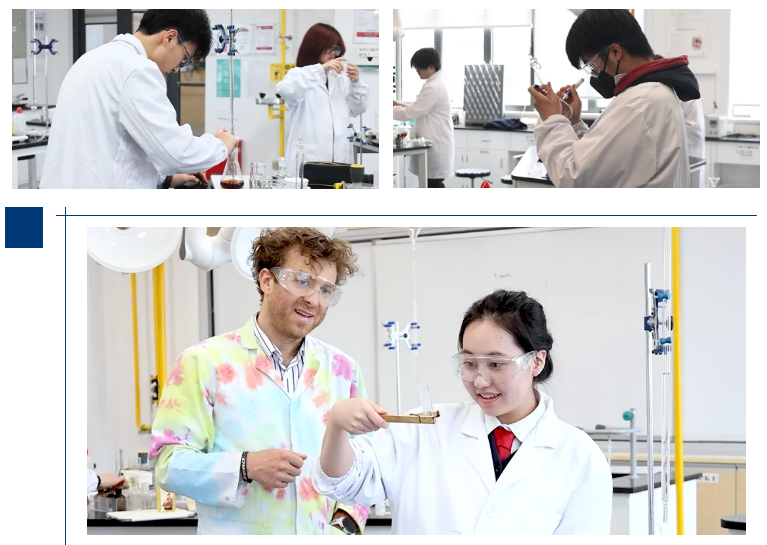
Advice from Dr Gabb
For students wishing to delve deeper into chemistry, whether in high school or at the university level, Dr Gabb offers the following advice: maintain an open and curious mindset, ask questions about the world, and strive to find the answers. He emphasises that success in chemistry is not merely about memorising facts and formulas.
"The key to mastering chemistry is to observe the patterns in the periodic table and understand why these patterns occur," explains Dr Gabb. He believes that when students comprehend the underlying principles, they can independently solve unknown problems. This approach is much more effective than simply trying to memorise content they do not truly understand. By cultivating a deeper grasp of the subject matter, students will be better equipped to tackle new challenges and apply their knowledge effectively.




